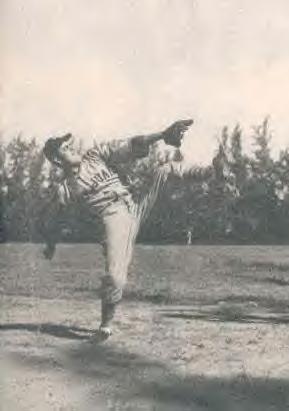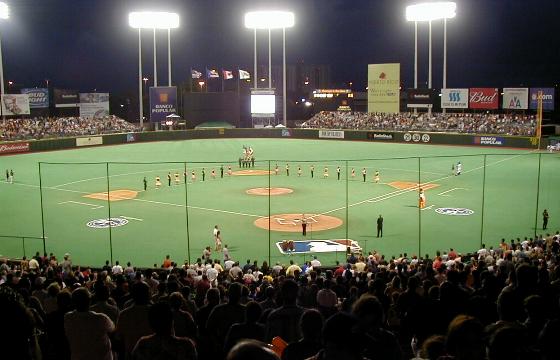 Hiram
G “Hi” Bithorn was in Santurce, Puerto Rico on March 18, 1916. In 1935, he helped the
Puerto Rican basketball team achieve a bronze medal in the Central
American and Caribbean games, and signed with Norfolk of the
Piedmont League in 1936, where he was 16-9 his rookie year. In 1937,
he was almost unbeatable as he posted a 10-1 record with
Norfolk and advanced to Binghamton of the Class A
Eastern League.
Hiram
G “Hi” Bithorn was in Santurce, Puerto Rico on March 18, 1916. In 1935, he helped the
Puerto Rican basketball team achieve a bronze medal in the Central
American and Caribbean games, and signed with Norfolk of the
Piedmont League in 1936, where he was 16-9 his rookie year. In 1937,
he was almost unbeatable as he posted a 10-1 record with
Norfolk and advanced to Binghamton of the Class A
Eastern League.
Bithorn joined
Oakland
of the Pacific Coast League in 1939 and then played for Hollywood in the same league in 1940 and 1941.
Bithorn became the first Puerto Rican major leaguer when he joined
the Chicago Cubs in 1942, making his debut against the Cardinals on
April 15. Bithorn finished the season with a 9-14 record and a
respectable 3.68 ERA.
In 1943, Bithorn was 18-12
for the fifth-place Cubs with an outstanding 2.60 ERA. He led the
National League with seven shutouts and his 18 wins was fourth best
in the league.
On the verge of a seemingly
outstanding career, Bithorn was inducted in the Navy on November 26,
1943, and served at San Juan Naval Air Station in
Puerto Rico where he was player-manager of the baseball
team. On March 22, 1944, he pitched in a 5-4 loss against the
Santurce Crabbers before 8,000 fans in San Juan for the benefit of the Red Cross War
Fund.
Bithorn was discharged from
service on September 1, 1945. He pitched for San
Juan in the Puerto Rican championships in February 1946,
and injured his hand while covering home plate in a game against
Mayaguez
which meant he was late reporting to the Cubs in the spring.
Encuentra el mejor
casino móvil en
linea México.
Bithorn didn’t have the
magic when he returned. Suffering from arm problems and possibly a
nervous breakdown, he was 6-5 in 1946, primarily as a reliever, and
was sold to the Pirates in January 1947. Bithorn never played in
Pittsburgh, however, as he was selected off
waivers by the White Sox two months later. He made just two relief
appearances for the White Sox, pitching an inning in each without
allowing a run and earning a win. Bithorn was released to Hollywood later in the
season and in turn was released by the Coast League club.
He underwent an operation in
1948 and was out of baseball all year but returned in 1949,
attempting a comeback with Nashville and
Oklahoma City. Quitting the game as a player
after the 1949 season, Bithorn became an umpire and worked his first
season in the Pioneer League in 1951.
On December 30,
1951, Bithorn was en route to visit his mother when he was shot and
killed by a police officer in El Mante,
Mexico. Bithorn had apparently been
trying to sell his car when Corporal Ambrosio Castillo Cano of the
El Mante police force questioned him. When Bithorn was unable to
produce the required paperwork, Cano drove him to the police
station, but on the way and altercation took place in the vehicle
and Bithorn was shot in the stomach with a .45 caliber pistol. He
was taken to the Ciudad Victoria hospital, which was 84 miles
away, and died a few hours later.
Hi Bithorn was just 35 years
old. His body was returned to Puerto Rico,
where he was buried on January 13. The people of
Puerto Rico
honored him in 1962 by having the country's largest stadium named
after him Estadio Hiram Bithorn.
Corporal Cano was indicted
on January 10, 1952, and on October 1, sentenced to eight years in
the state prison for Bithorn’s homicide.




